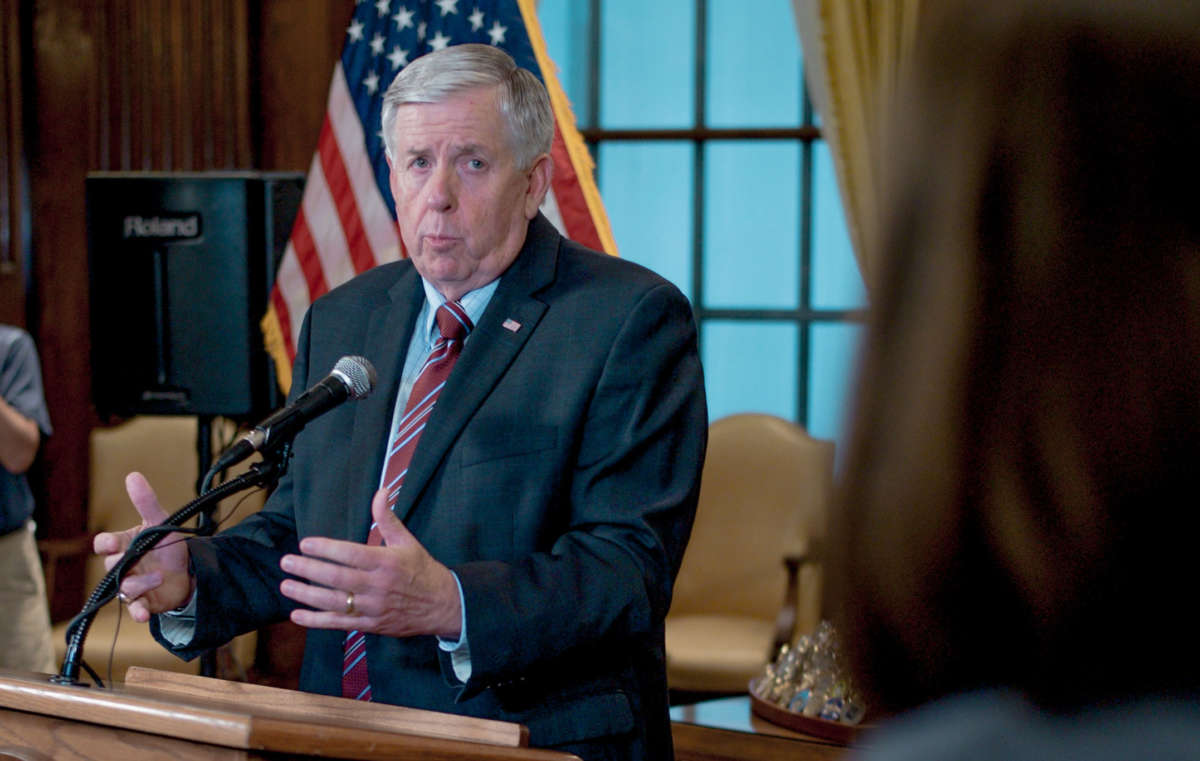Missouri Governor Mike Parson, a Republican, has a stark message for parents of schoolchildren who might be worried about the spread of coronavirus if schools reopen this fall: their kids will “get over it,” he said.
Parson insisted in a radio interview on Friday that schools would reopen across the state. He also downplayed the fears that some children might get sick from COVID-19 as a result of going back.
“These kids have got to get back to school. They’re at the lowest risk possible,” he said. “And if they do get COVID-19, which they will — and they will when they go to school — they’re not going to the hospitals.”
Kids will not “have to sit in doctor’s offices” if they get sick, he added. “They’re going to go home and they’re going to get over it.”
Parson’s words, however, are a simplification of the reality of the disease. While it’s true that children on the whole have been less likely to contract COVID-19, to require hospitalizations, or to die from it, in April, doctors in London reported that some children with COVID-19 appeared to develop an inflammatory condition called Kawasaki’s disease, which can attack the heart.
Moreover, as with adults, children with other medical concerns are more susceptible to the disease, with their chances of being seriously ill increasing if they have an underlying ailment.
One study also noted that simultaneously facing other illnesses such as influenza makes it more likely that kids could have severe complications from coronavirus — something researchers said “might have implications for the winter period 2020–21, when the incidence of other viral respiratory tract infections … is bound to increase.”
And while death rates are much lower for children than they are for adults with this disease, it’s not impossible for kids, even without underlying health issues, to get sick or even die from it. The same study found that around 0.69 percent of children who contracted COVID-19 may die from the virus — a low number, to be sure, but equivalent to two deaths for every 300 kids who get sick.
Parson also seemed to ignore the fact that children are not the only ones at risk of coronavirus if they return to school. As State Auditor Nicole Galloway pointed out, parents and other family members, as well as teachers and school staff, are also at risk.
Coronavirus “doesn’t stop with our children,” Galloway, a Democrat who is running against Parson in the gubernatorial election later this year, said on Facebook in response to his comments. “The teachers, bus drivers, janitors, food service workers, parents, grandparents and neighbors who our children see every day are susceptible to this virus, too. We need a plan that keeps all Missouri families safe.”
In a separate tweet on the issue, Galloway also noted that children are also at risk, despite what Parson said about the disease. “Does he not realize multiple American kids have died after being infected?” she wrote.
This is stunning ignorance from @GovParsonMO on how COVID-19 affects children. He admitted that he's okay with your kids (and your families) getting the deadly disease when he sends them back to school. Does he not realize multiple American kids have died after being infected? pic.twitter.com/UZtjt043Fs
— Nicole Galloway (@nicolergalloway) July 17, 2020
Many state and local governments across the country are trying to determine what course of action to take when it comes to the coming school year. President Donald Trump has insisted, however, that schools should reopen, and furthermore, spurned recommendations from the Centers for Disease Control and Prevention (CDC) that suggested ways to do so in a safe manner as being too burdensome and expensive.
However, a document that was leaked from the White House and obtained by The New York Times revealed that Trump’s own advisers believe reopening schools across the U.S. could be problematic, likely resulting in a greater spread of coronavirus.
“Trump suppressed a CDC report that concluded ‘fully opening schools and universities remained the highest risk for the spread of coronavirus,'” American Federation of Teachers President Randi Weingarten wrote in a tweet in response to news of the document. “Trump, Pence, DeVos had this report and said the exact opposite. His intentional lies will endanger thousands.”
Join us in defending the truth before it’s too late
The future of independent journalism is uncertain, and the consequences of losing it are too grave to ignore. To ensure Truthout remains safe, strong, and free, we need to raise $43,000 in the next 6 days. Every dollar raised goes directly toward the costs of producing news you can trust.
Please give what you can — because by supporting us with a tax-deductible donation, you’re not just preserving a source of news, you’re helping to safeguard what’s left of our democracy.
